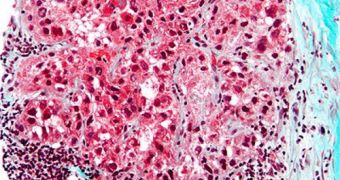A grand-scale genetic study has revealed that a single genetic variant can be considered responsible for the frequent onset and development of liver cancer in people who are chronic hepatitis C virus carriers.
This segment of the population has been known to be at higher risk of developing the horrible condition than their peers, but thus far the exact mechanisms that caused this connection to occur have largely remained mysterious.
No less than 3,312 study subjects were analyzed during this investigation, details of which appear in the latest issue of the top scientific journal Nature Genetics. The genome-wide study was carried out with utmost precision.
These results were obtained by a collaboration of experts from the RIKEN Center for Genomic Medicine, the Hiroshima University Hospital and the Sapporo-Kosei General Hospital, all in Japan.
For their work, the experts focused their attention on a form of liver cancer called hepatocellular carcinoma (HCC), the seventh most common form of cancer globally, and the third leading cause of cancer deaths.
Official statistics show that more than 30,000 people die from HCC every single year. In more than 70 percent of these cases, the hepatitis C virus (HVC) is involved. Experts have known that the viral agent is a main risk for this type of cancer for many years.
The first phase of the study involved 765 HCV carriers without HCC and 212 HCV carriers with the cancer. The team browsed a total of 467,538 single nucleotide polymorphisms (SNP) – genetic markers that can help pinpoint the genetic cause of diseases.
A SNP located on a gene called DEPDC5 was found to be responsible for the connection. The second part of the study involved testing these results, on a group of 2335 HVC carriers. Of these, 710 had HCC, while 1625 had not been diagnosed with liver cancer.
“The significance of the findings was further highlighted when the researchers adjusted their results for gender, age and platelet count, revealing that among Japanese individuals with chronic HVC infection, the DEPDC5 SNP roughly doubles the odds of developing HCC,” EurekAlert reports.
The Japanese team says that the new study has already provided an invaluable new target for therapy techniques. In the future, innovative courses of treatment will aim to influence this DEPDC5 SNP locus, with the hope that this would prevent HVC from causing hepatocellular carcinoma.

 14 DAY TRIAL //
14 DAY TRIAL //